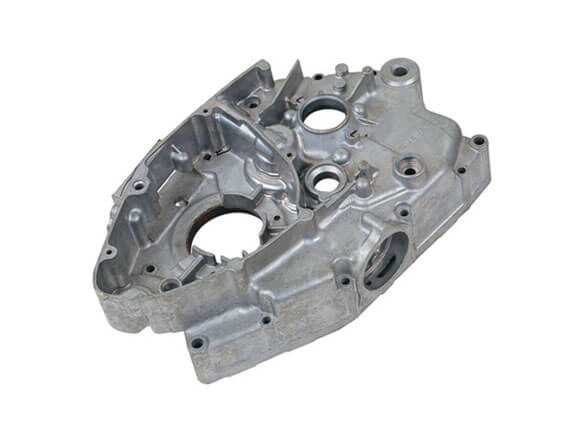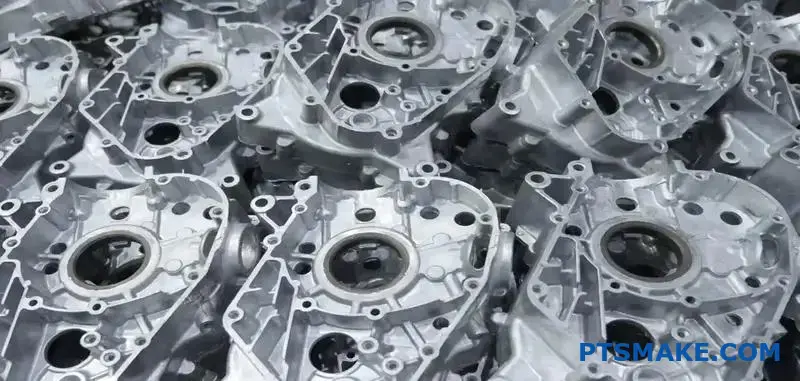The Future of Light Weight Aluminum Foundries: Advancements and trends Shaping the Sector
The light weight aluminum foundry sector is undertaking substantial change. Trick fads highlight the significance of sustainability and performance. Developments in smart production and automation are ending up being widespread. Factories are progressively focused on using recycled products. This shift questions concerning future methods and innovations. Just how will these modifications effect manufacturing techniques and market dynamics? The solutions may redefine the market landscape in unexpected ways.
Improvements in Smart Manufacturing Technologies
As the light weight aluminum foundry market progresses, improvements in smart manufacturing modern technologies are ending up being significantly necessary for boosting efficiency and effectiveness. The integration of automation, expert system, and the Web of Points (IoT) is changing traditional shop operations. These innovations make it possible for real-time surveillance of processes, permitting immediate changes that maximize outcome and decrease waste.
In addition, artificial intelligence algorithms analyze manufacturing information to determine patterns and forecast maintenance demands, lessening downtime. Robotics are progressively employed for repetitive tasks, freeing knowledgeable employees to concentrate on even more intricate obstacles. Furthermore, electronic doubles-- virtual designs of physical procedures-- help with simulations that can boost layout and functional techniques.
The fostering of these wise manufacturing technologies is driving competitive benefits in the light weight aluminum shop industry. By simplifying process and boosting decision-making capabilities, factories can fulfill expanding market needs while preserving high-grade criteria. The future of aluminum shops is without a doubt connected to these technical advancements.
Welcoming Eco-Friendly Products and Processes
The light weight aluminum factory sector is significantly concentrating on environmentally friendly products and processes to enhance sustainability. This change includes the adoption of sustainable product sourcing, energy-efficient manufacturing techniques, and efficient recycling and waste monitoring techniques. By incorporating these practices, shops aim to minimize their environmental effect while maintaining competition out there.
Sustainable Product Sourcing
Exactly how can light weight aluminum factories boost their sustainability initiatives? Sustainable product sourcing has actually become a vital approach in attaining this goal. By prioritizing recycled light weight aluminum, shops can considerably lower their ecological footprint, as recycled materials require less energy and less resources contrasted to key light weight aluminum manufacturing. Additionally, sourcing materials from licensed suppliers who follow eco-friendly techniques promotes liable mining and lessens eco-friendly effect. Factories are likewise exploring different materials, such as biopolymers and environment-friendly finishings, to match traditional light weight aluminum processes. Working together with stakeholders, including suppliers and ecological organizations, fosters technology in sourcing methods. Inevitably, welcoming lasting material sourcing not only aligns with global sustainability objectives however also positions light weight aluminum foundries as leaders in eco liable production.
Energy-Efficient Manufacturing Strategies
Aluminum factories are increasingly adopting energy-efficient manufacturing strategies to complement their lasting product sourcing campaigns. These techniques concentrate on reducing power usage throughout the production procedure. Advanced technologies, such as induction melting and optimized spreading procedures, are being implemented to reduce the total carbon footprint. Furthermore, automation and clever manufacturing systems boost operational efficiency, permitting better power management. Foundries are additionally discovering the integration of renewable energy resources, such as solar and wind, to power their operations. By prioritizing power effectiveness, aluminum factories not just reduced manufacturing expenses however likewise straighten themselves with international sustainability goals, making sure a much more ecologically liable method to light weight aluminum production while fulfilling the increasing need for environmentally friendly practices in the market.
Recycling and Waste Monitoring
Welcoming eco-friendly products and procedures, aluminum factories are focusing on recycling and waste monitoring methods to enhance sustainability in their procedures. By incorporating closed-loop systems, these facilities are minimizing waste and taking full advantage of source effectiveness. Scrap aluminum, an easily available material, is being reused on-site, substantially minimizing the need for virgin products and decreasing power intake. Advancements in sorting and refining modern technologies better help with the recycling of light weight aluminum, making certain that even polluted products can be repurposed effectively. Additionally, shops are taking on sustainable methods such as minimizing contaminated materials and advertising making use of naturally degradable materials for product packaging. This commitment to recycling not only lowers ecological impact but additionally improves the economic stability of aluminum shops in an open market.
The Function of Automation and Robotics
Automation and robotics are progressively transforming the light weight aluminum foundry market, considerably enhancing production efficiency. By incorporating innovative innovations, factories can lower labor prices while all at once enhancing security criteria for their workforce. This change not just enhances procedures but additionally positions the industry for sustainable development in an affordable market.
Improved Manufacturing Performance
Reinventing manufacturing processes, the combination of sophisticated robotics and automation modern technologies has become a cornerstone for aluminum foundries seeking improved effectiveness. These technologies enhance process, reduce cycle times, and enhance item high quality by lessening human mistake. Automated systems can keep an eye on manufacturing lines in real-time, permitting for instant modifications that enhance result. Additionally, robotics assist in the handling of harmful materials, ensuring more secure functioning environments while raising throughput. Predictive maintenance technologies additionally contribute to efficiency by expecting devices failings, therefore decreasing downtime. Consequently, aluminum foundries can attain higher uniformity in their products while reacting a lot more quickly to market demands. This accept of automation is setting a new criterion for performance and functional excellence within the industry.

Minimizing Labor Expenses
The change in the direction of advanced robotics and automation in aluminum factories not only boosts manufacturing efficiency yet also plays a significant function in reducing labor expenses. By incorporating automated systems, foundries can minimize the reliance on hand-operated labor, which frequently includes high earnings and training costs. Robotics simplify repeated jobs such as putting, molding, and ending up, permitting a greater output with fewer workers. This technical adjustment not only minimizes labor-related expenses yet likewise boosts uniformity and high quality in production. Additionally, automation can operate all the time, optimizing operational hours without the connected prices of overtime or shift differentials. Because of this, aluminum foundries can accomplish substantial financial savings while maintaining competitive pricing in a developing market landscape.
Improving Safety Specifications
While traditional light weight aluminum foundry procedures frequently subject workers to unsafe settings, the combination of robotics and automation substantially improves safety and security standards within the sector. Automated systems can execute high-risk tasks, such as molten metal handling and heavy lifting, minimizing human direct exposure to dangerous conditions. Additionally, robotics can operate in severe temperature levels and harmful environments, efficiently reducing the danger of injury. Advanced checking modern technologies and artificial intelligence guarantee real-time safety assessments, allowing for instant responses to prospective threats. Additionally, automation enhances operations, reducing the likelihood of accidents brought on by human mistake. Because of this, the fostering of these modern technologies not just boosts security yet additionally cultivates a more productive and effective functioning atmosphere in aluminum shops.
Enhancing Power Efficiency in Production
As light weight aluminum shops seek to keep competitiveness in a progressing market, enhancing power effectiveness in manufacturing has arised as an essential emphasis. By embracing advanced innovations such as high-efficiency melting heating systems and automated temperature level controls, factories can especially decrease energy intake. Carrying out real-time tracking systems allows for exact tracking of power usage throughout the production procedure, making it possible for quick modifications to enhance effectiveness.
In addition, moving to different power sources, including eco-friendly choices, can further decrease the carbon footprint. The assimilation of energy recuperation systems, which find reclaim waste warmth for reuse, is ending up being significantly common. Educating employees in power management techniques ensures that everybody entailed in the production process is conscious of power usage.
These campaigns not only lower operational prices yet additionally straighten with worldwide sustainability goals, placing aluminum factories as accountable gamers in the market while enhancing their general competition. - aluminum casting
Innovations in Recycling Aluminum
Advancements in recycling aluminum have actually acquired momentum alongside initiatives to boost power effectiveness in manufacturing. The light weight aluminum market has welcomed innovative technologies that improve the reusing process, decreasing energy usage and environmental effect. Techniques such as hydrometallurgy and new sorting technologies improve the extraction of light weight aluminum from scrap, enhancing return prices and guaranteeing better recycled material.
The growth of closed-loop recycling systems enables foundries to recycle light weight aluminum without substantial degradation in high quality, making the process much more lasting. Technologies in logistics and collection, consisting of enhanced radar and automated sorting, have also played an essential duty in increasing the effectiveness of light weight aluminum recovery. These developments not just add to a round economy but additionally aid alleviate the carbon page footprint linked with light weight aluminum manufacturing. As the demand for sustainable methods expands, these advancements place the light weight aluminum shop field as a leader in responsible source administration.
Reacting To Market Demands and Consumer Trends
Adaptability has actually come to be a foundation for aluminum foundries replying to evolving market demands and consumer trends. As sectors significantly focus on sustainability, light weight aluminum shops are changing in the direction of eco-friendly techniques, including enhanced reusing processes and lowered carbon impacts. This shift straightens with customer preferences for eco liable products, driving shops to introduce their offerings.
Furthermore, the rise of lightweight products in aerospace and automobile industries demands developments in light weight aluminum alloys and casting techniques. Factories are purchasing r & d to produce high-strength, light-weight parts that fulfill rigid efficiency criteria.
Modification has actually acquired grip, with consumers seeking tailored options. Light weight aluminum foundries are leveraging innovative manufacturing innovations, such as 3D printing, to accommodate specific customer demands effectively. This responsiveness not only satisfies consumer demands yet likewise placements light weight aluminum foundries competitively in a vibrant market landscape, guaranteeing their importance in an ever-changing industrial setting.

Regularly Asked Concerns
Exactly How Do Light Weight Aluminum Foundries Effect Citizen Economies?
Aluminum foundries significantly impact local economic situations by creating tasks, stimulating need for neighborhood vendors, and adding to area advancement. Their procedures commonly lead to raised tax obligation earnings, which can fund necessary civil services and facilities enhancements.
What Are the Safety And Security Laws for Light Weight Aluminum Shop Employees?
Safety guidelines for aluminum factory workers consist of necessary individual safety tools, correct air flow systems, routine training on dangerous products, and adherence to guidelines set by job-related health and wellness and safety and security administrations to minimize dangers and assurance worker safety. - Precision aluminum casting
Just How Does Light Weight Aluminum Recycling Affect Global Supply Chains?
Light weight aluminum reusing significantly decreases demand for raw products, boosts resource performance, and supports rates. This shift impacts worldwide supply chains by cultivating a round economic climate, promoting sustainability, and ensuring an extra resistant sector in varying markets.
What Career Opportunities Exist in the Light Weight Aluminum Foundry Industry?
Various profession chances exist in the aluminum shop industry, including duties in engineering, quality control, production management, and research and growth. Competent labor settings such as mold and mildew makers and maker drivers are additionally sought after.
Just How Do International Profession Plans Impact Light Weight Aluminum Foundries?
International profession plans considerably affect aluminum shops by impacting import tolls, supply chain dynamics, and market gain access to. These factors can affect operational costs, competition, and total productivity within the global light weight aluminum production landscape.
By focusing on recycled aluminum, shops can significantly minimize their ecological impact, as recycled materials require this page less energy and less sources contrasted to main light weight aluminum manufacturing. Aluminum shops are increasingly embracing energy-efficient manufacturing techniques to complement their lasting product sourcing efforts. Automation and robotics are increasingly changing the aluminum foundry sector, significantly boosting production effectiveness. The shift towards advanced robotics and automation in aluminum factories not only improves manufacturing effectiveness yet also plays a considerable role in reducing labor costs. As light weight aluminum foundries look for to keep competition in a progressing market, improving power performance in manufacturing has emerged as an essential focus.